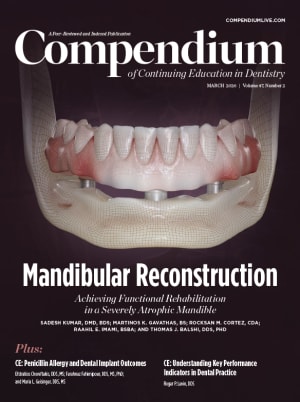Pulpdent High on Total-Etch Adhesion Today, Sees Rise in Bioactive Materials Ahead
Founded by a dentist nearly seven decades ago, Pulpdent Corp. has maintained a commitment to improving the dental profession for the good of dentists and the patients they serve, according to Larry Clark, Pulpdent’s Director of Clinical Affairs and Marketing. That commitment, he says, goes far beyond products sales.
“Pulpdent is, first and foremost, a dental company, committed to helping people live in comfort, smile with confidence, and lead healthier and more productive lives,” he says. “We are focused on improving dentistry and the materials used, not just selling products.”
According to Clark, Pulpdent has since 1994 emphasized the value of the total-etch adhesion technique, which he points out, has been supported by many years of research. “As far as we know,” Clark says, “Pulpdent is the only dental manufacturer of PMGDM (also known as Bis [Glyceryl Dimethacrylate] Pyromellitate) for 4th and 5th generation bonding products. Quality and research build trust and confidence.”
Referring to self-etch adhesives, Clark says, “When they were first introduced, self-etch adhesives showed a lot of promise in terms of reducing sensitivity and ease of use. For those reasons there was a large shift away from 4th and 5th generation bonding agents. I think the impact of self-etch adhesive is starting to recede, as continued research has shown issues with bond strengths to enamel versus dentin as well as the MMP (matrix metalloproteinase) effect—cell-derived proteolytic enzymes that may destroy collagen and other proteins in the extracellular matrix and hybrid layer, thereby compromising bond strength. With self-etch, there have been both positives and negatives.”
Clark says Pulpdent offers clinicians a wide variety of supportive materials and programs that explain the science of adhesion as well as recommended techniques. “We were the first company to publish educational materials and graphics that explain bonding to dentin, enamel, metal, and ceramic surfaces,” he states. “We offer in-depth instructions for product usage to enable clinicians to achieve maximum success.”
Additionally, he says, Pulpdent co-sponsors educational events through the Academy of General Dentistry, local study groups, regional meetings, and national meetings. He explains that the company’s approach to education reflects Pulpdent’s customer service philosophy. “We think more issues are resolved with education regarding good technique than with marketing claims. Our longevity in the adhesive product category has helped advance the proper usage of adhesives in many dental practices around the world.”
On his expectations for the future of adhesion, Clark says he believes there will be better options—specifically bioactive and biomimetic materials. “The future of resin bonding to dentin with solvent-based materials is a question mark,” he says. “New mechanisms for adhesion, integration, and sealing of dentin are in the works using bioactive and biomimetic technologies. These materials will behave more like natural teeth and will change the way we think about restoring teeth. The use of bioactive materials complements the natural dentition with ionic bonding and sealing potentials.”
Pulpdent, he says, is working on advances in this area. “During the next 5 years, we will focus on bioactive and biomimetic products for the replacement of dentin and enamel,” he explains, saying that the company has already been researching and developing bioactive materials that exhibit ion diffusion, biocompatibility, a positive seal against bacterial leakage, and the ability to mimic the chemical and physical properties and functions of dentin and enamel.
“We have patented materials that behave more like natural teeth; they exchange ions, absorb shock, and take advantage of the moist oral environment. These will lead to new ways to approach the restoration of dentin and enamel.” These new materials, he says, will achieve adhesion with devices that will make restorations easier to place and less technique-sensitive.
In short, the ideal in dental adhesion, Clark says, would be “a non-solvent-based product that seals and bonds to dentin and enamel without long-term degradation of the interface.” While that product does not yet exist, he says Pulpdent is working on it.
Pulpdent Corp.
80 Oakland St
Watertown, MA 02472
800-343-4342
dentalaegis.com/go/cced489
